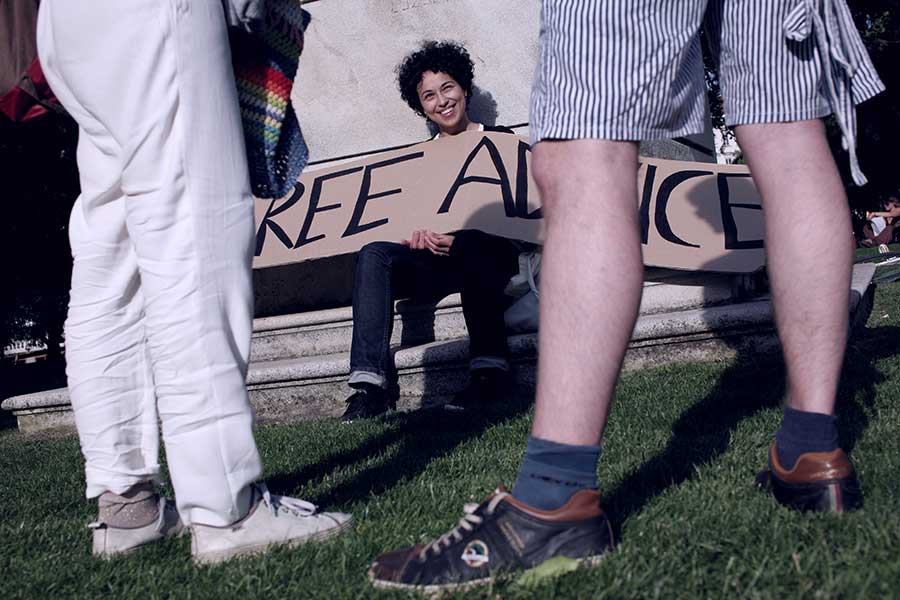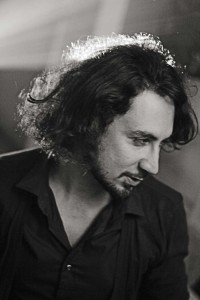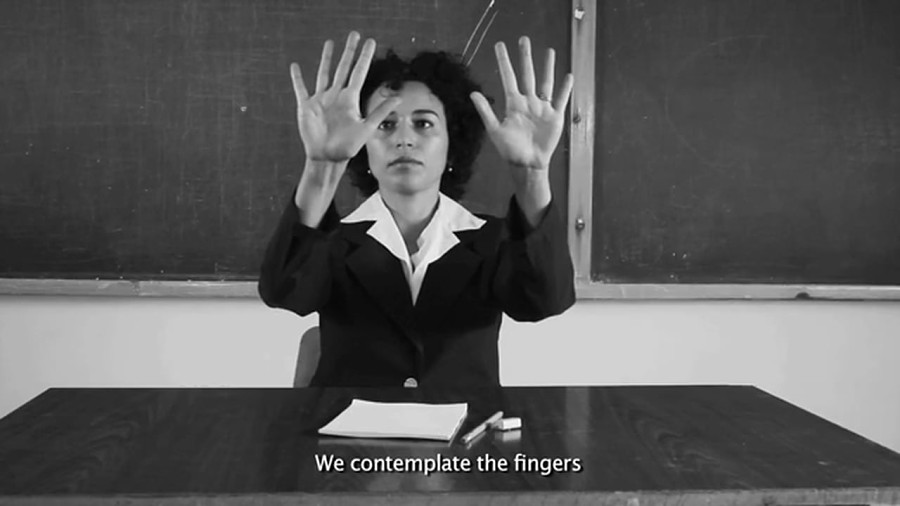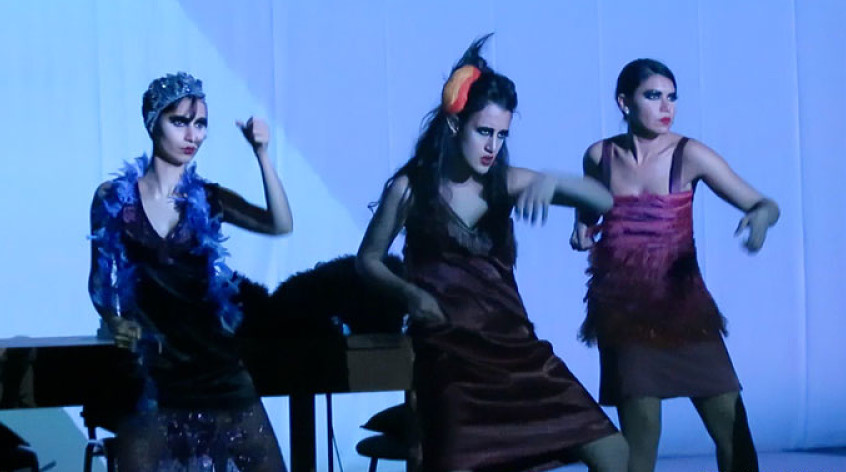The curators of the recent Live Ideas Festival, which presented more than 40 performing arts events and panel discussions by and with artists from the Middle East and North Africa at the Bill T. Jones-run New York Live Arts between Feb. 8 and April 2, certainly planned its programming well before the current U.S. presidential campaign and its reliably overheated rhetoric about the state of the world. But what audiences got, in a wildly various series of solo and ensemble works and wide-ranging conversations, might have been expressly designed as an antidote to the poison coursing through our public dialogue about what is variously called “the Arab world” (though of course it encompasses many who are not Arabs at all), or has lately been given the slightly more neutral regional moniker of MENA, for Middle East and North Africa.
The Live Ideas Festival, co-curated by Thomas Kriegsmann and Adham Hafez, was titled “MENA/Future: Cultural Transformation in the Middle East North Africa Region.” But perhaps its most transformative aspect was the way it unsettled and upended expectations about what kind of work may be “typical” of the region—which, after centuries of colonialism and continuing Western interventions, has an inevitably complicated relationship with European performance traditions, including, among other things, political theatre. Audiences who went in anticipating lacerating critiques of imperialism or patriarchy, of occupation and repression, were confronted not with ambassadors or emissaries but, of course, with artists and intellectuals possessed of a full range of aesthetics, contexts, and concerns.
But while none of the works was created for American audiences, these artists don’t work in a vacuum; they are more than familiar with the West’s expectations, and are acutely conscious of when they’re working toward or against them. This self-reflexiveness reached a sort of climax in Live Ideas’ closing weekend, when Hafez, the festival’s Cairo-based co-curator, presented his own 2065 BC, a performed symposium/installation based on the notorious 1884 Berlin Conference, in which the European powers essentially divvied up the colonial spoils of Africa and the Middle East.
If his was arguably one of the festival’s more explicitly political pieces, it is not because Hafez exclusively privileges that kind of work, as he told me in an interview some weeks before the performance. He was joined on the phone by Farah Saleh, a Palestinian choreographer/performer who presented an interactive solo work, Free Advice, as part of the festival. Both are currently partly ensconced in U.S. academia: Saleh as an adjunct lecturer at Brown University’s department of Theatre Arts and Performance Studies and Middle East Studies, Hafez as a Ph.D. candidate at New York University’s Tisch School of the Arts.
ROB WEINERT-KENDT: Do you each think of your work as being specifically Egyptian or Palestinian, respectively, or as part of a larger Arab culture and dialogue?
ADHAM HAFEZ: In one way or another we are all working on very similar concerns; we are all working within similar conditions. So in that sense you are in relation to other works; you are part of same dynamics and part of certain questions and certain struggles. It does not mean that we share an artistic practice, or that within the region generally everybody is sharing a practice because they are together in that field. So I don’t know that I would say there is a certain “movement” happening in the region and that it is unified and homogenous.
FARAH SALEH: I know many of the artists who are coming to the festival on a personal level and have seen some of their work, but I’ve never had the opportunity to collaborate with nearly any of them, except in the Palestinian piece, Badke, which I was part of as a dancer. Because of the political situation, most of us cannot cross borders. Logistically it’s very difficult. From a conceptual point of view, I think there are many different concerns. I cannot put everyone in one bag, even in the Palestinian context.
Looking at your resumés, I see that you both work in performance, as practitioners, but also in linguistics and semiotics—you are both good at talking and thinking about the work as well as doing it.
SALEH: I think it’s common practice now, at least among the artists I’m very much in contact with, that you would have theoretical research behind your own work. So even before going to studio, you read some texts that interest you or you read about other artists’ work. It’s a practice I’m very much interested in, because it adds layers and other levels to the work itself.
HAFEZ: When we started the company in 2003, it was very clear that we were investing so much in research for the productions—not research for the sake of research, but research for the sake of producing a different kind of aesthetic, a different kind of a relation between us working together. Also to figure out a different economy, because the economy of making dance anywhere is so challenging. I moved here to New York, and I was like, “Oh my God, it might be better in Cairo”—just hearing the stories of dancers here saying that they mostly work unpaid and that they barely survive and that every dancer is a waiter. I was like, “At least it’s still not that bad in Cairo.” It’s bad, but not that bad.
So we ran workshops, we ran research labs, and then, after 3 years, this research practice formalized itself and separated itself from the company. It became a platform called HaRaKa, which means “movement,” and we use the term very vaguely as to what kind of movement are we talking about. It is a performance study project in its core, but we’ve worked with architects, we’ve worked with urban planners, we’ve worked with demographers. So, yes, I’ve always had one foot in here and there, and now that I’m in New York at Tisch for my Ph.D., I’m wondering how I will continue keeping the balance, because running a company in Cairo while doing a Ph.D. in New York—it’s not exactly around the corner.
Farah, tell me about your show Free Advice, which you brought to New York.
SALEH: It was developed out of my research around my professional role as an artist in Palestine in 2014, 2015, after the Arab Spring. In Palestine there were social movements, not only political movements, rising up, and I wasn’t understanding why I was making dance at the moment. I wanted to find a reason and reconnect it with the social/political movements. Because in the liberation movement in Palestine, artists always had really an active role. Somehow after the Oslo Agreement that shifted, and then the second intifada happened and that shifted again. And now there is maybe a third intifada? But even before that my research started.
My idea was to go into the streets to try to find a dialogue with people, because I felt that many artists and dancers were talking about social and political issues while always working in dance studios, then presenting these issues to the elite of Ramallah or a few other cities where they present their work. I was one of them for many years, and it’s not like it’s wrong to work in studios and discuss these matters with fellow artists and your colleagues; it’s already a movement when you discuss within yourselves. But for me it was important to go to the streets and talk to people and understand their concerns. From these talks, I went to the studio then and worked with these concerns to transform them into an interactive dance performance where these concerns appeared, where the dialogue that happened on the streets could somehow continue with the people, the audience. I ask them to do things; we interact. I order them to do certain things—to take initiative in political decisions at a certain point.
In the video trailer, it looked like maybe a dozen people in the audience. Will it be larger in New York?
SALEH: That was like the first run; it was a snowy day in Ramallah, so I had only like 10 people. I usually have between 40 and 100 people coming to the performance.
Did you just say a “snowy day in Ramallah”?
SALEH: Yeah, it snows every year in Ramallah, actually.
Ah, that’s my ignorance. I did not know.
SALEH: That’s okay. It snows for two days, and it’s a panic.
Adham, I also looked at the trailer for 2065 BC, and I couldn’t tell how much it’s made clear to the audience that it’s a kind of reiteration of the infamous 1884 Berlin Conference.
HAFEZ: It’s made explicit before you even enter. When audiences enter in the hall we give them a package where there is printed the original historical text of the Berlin Conference, the contracts and the agreements—this material that shaped the history of colonialism, or articulated it in ways that were legal, and that made a crime legal. So you enter with this in your hand, and it’s being read to you and the performance is very, very long and tedious; it’s really a boring political conference. We use the text as much as we can. But there’s one part of it with a collage of many other texts; these are not announced, but you know it’s Margaret Thatcher, Churchill, Obama, Nasser—fragmented texts from iconic speeches that were given and were often used in a very totalitarian way. So there’s something about disengaging this delivery of political speech, but at the same time really doing it too.
It’s set in the future and it seems to be a conference of all female leaders. Is it portraying a better future, a utopia?
HAFEZ: It’s catastrophic. We started working on it a couple of years ago because we were all disenchanted with the current political reality—not just back home but also generally how foreign policy from the States or from Europe is toward the region, and how this sits in a very particular history of colonialism. And we were like, “What would be better? If all leaders were women, or if they’re all queer? What would be better?” And the answer was very obvious: It’s not who sits in this machine, it’s the fact that the machine itself is not working anymore. So that’s why we insisted on using an all-women cast for this feminist illusion—it’s just bound to fail.
Farah, you mentioned the Arab Spring. Is that still something you talk about? You’re both fairly young, and were even younger in 2011. Do you feel hopeful about that moment and what’s to come?
SALEH: I personally didn’t go through specifically that moment; there were just a few demonstrations in Palestine for a few weeks. We have continuous clashes with the Israelis—that’s not our Arab Spring. I am hopeful in that I see that the Palestinian Authority is going to collapse soon, and I think that’s the only way that the apartheid will be finally official—like, it is there since 1948, but it will become official again. And for me that’s hopeful, because then in some way or another the world cannot just pretend it’s not there. I think a big solution would happen maybe in 50 years; I think this is the start of an end. And in that way I’m hopeful. It won’t be fast, of course—like, it won’t be in my lifetime.
ADHAM: When I moved to my house where I live in Cairo on Tahrir Square, I moved there because it’s one of these areas where it’s very busy in the morning and then quiet all day; I moved there because I was like, “Great, I need a quiet place.” Little did I know in just some years it was going to be a madhouse! There were these moments where if you didn’t go out to be in the middle of it, the thing would come into your house. You could be sitting at home hiding from the revolution, and then a tear gas canister would be thrown into your balcony. So you were like, “I’m better actually being on the street.” So the inside and the outside and the personal and the political and the private and the public all were so confused, and always so confusing during those years. In a way that was so critically productive to my thinking. I was at the time doing my masters degree in Holland and I just couldn’t go back; I wrote to the university and I was like, “I need to stay here for as long as it’s going to take.” I stayed six months, and I wasn’t able to think outside of that revolution.
At the same time, while we were starting with a lot of hope, we were also starting with a very disenchanted and politically depressed position, which still is going on. We are still politically depressed and we are very aware of this. The term Arab Spring itself pisses us off—me personally, but like almost everybody that I know. Because it’s such an imposed term, it unifies conflicts in a whole region that are so—like what’s happening in Syria has to do with things that have been happening there for the past 40 years, what’s happening in Egypt has to do with the Nasser regime from 60 years ago. So you cannot paint it all in one color.
Do I have hope? I don’t know. I don’t know if you saw this film Melancholia, the Lars von Trier thing? It’s really great; I mean, it’s so depressing, it’s about the end of the world. The proposition which the film offers, which I found liberating, is: What can you do when you know this is the end of the world? What are you going to do? What the film proposes is that you build the most fragile structure, the most fragile shelter, and you sit in it. And I was like: This is fantastic. This is exactly what we need to do in face of such massive events and hopeless situations. You don’t think of hope, you think of work. You just go to work, and if the work is incredibly fragile then that’s exactly what it needs to be. Because the tension between this fragility and the obscenity of something so large—it’s in this tension that there might be any possibility for change. So I’m all for smaller actions, very focused work, very localized work, rather than big, very generic general dreams.
That leads back to what Farah alluded to, where she was wondering, Why do dance? What does dance have to say with so much going on in the streets? So I was wondering if both of you could answer: What do you think theatre has to say? Does it have a role in dissent, or in simply speaking to the moment where you are?
SALEH: I think it always has a role; it’s how to play to that role, what to bring, how to think out of the box. Because if you consider yourself an artist or an intellectual, you have a huge role. You’re doing what you’re doing because it’s your responsibility, I think, to talk to the people in the different way, to sometimes present hope, but also present reality. For me in Palestine now what’s important is how to get to the people. Because sometimes it’s becoming very elitist and very centralized in Ramallah, and it has to be decentralized, it has to go to the streets. I hate the words “raise awareness,” but I think we should work with people in order to understand that it’s not a hobby or it’s not luxurious to go and see a performance, to pay for an event—or not pay, because with everything in Palestine now, there’s this humanitarian approach that started with the Oslo Agreement which we as artists need to break and create an artistic economy. It’s also a lot about teaching, because I think with art you can create really strong individuals, even if they don’t want to become professional artists or practitioners. Again for me it has to be on the ground; it doesn’t have to be in big fancy theatres. It could, but that’s not what I’m looking for right now.
HAFEZ: I agree with Farah. There’s so much to learn from the audiences. How can I learn from people working in social movements? When you live in a city with 20, 25 million people in it, it should never be possible that you have an empty hall if you’re doing a talk or a performance. It’s just about knowing who wants to see what, who wants to hear what. You have 20 million people eager for change and eager for entertainment also.
I remember the very, very intense days where we had lockdowns and streets were under national curfew, where you had to go home at 8 in the evening and stay until the morning. People did not want to go to theatres and watch revolutionary and political work. People wanted to go there and watch everything else that is about life. That was really a clear moment for me where I realized there’s a huge problem in the arts market as it is now, because in the international circuits where contemporary performance work from the Arab world would be circulating, all curators were expecting, you know, revolutionary, political work. But do they know what’s being produced there? No. Do they know what the Arab audience and Arab artists actually care about now? No. What is political performance now? In certain cities a political performance is the fact that a woman is making work and she is there onstage alone making work, and that’s enough. If she is there dancing the music of Chopin or talking about apples and peaches, that’s enough; that’s very political. But of course it doesn’t translate as political to people in the West and the U.S., where it’s a whole different story. But it’s the same if you display the work from the U.S. or Europe in an Arab city without its context. So there’s a lot to learn about contexts.
It’s interesting to hear you both talk about theatre being seen as a luxury for elites, as that’s a dialogue that goes on here in the U.S. all the time. Since you’re studying in the U.S. and this festival has brought you together here in New York, what are your impressions of the state of politics and theatre here?
HAFEZ: One thing that concerned me or confused me the most when I arrived—it’s not the first time that I’m in New York, but it’s the first time that I’m here with the decision to be here for a long period. Hence I started investing in a relation to the performance scene here; I need to know who’s working, I would like to know where are the venues that present political, contemporary dance, and I’ve been lost trying to find the politicized work in the field of dance and performance. So I’m asking: Is it because my eyes cannot see politics here? Is the register of what political work is in the U.S. something that I cannot understand or see, in the way that a foreign eye coming to the Arab world may not see for the first time? Or are we in a moment where the art market and its aesthetics have hijacked everything and commodified it in a sense, that whoever is making political work here is not going to be in any of the big spaces but is going to a sub-sub-smaller underground kind of scene? If so, then it’s a little bit like back home, where there are all these cracks in the walls and you go there and you find exciting stuff; it’s not going to ever be at the Cairo Opera House, you know? So I’m still in this moment of wondering: What’s up, New York?
SALEH: In Providence where I’m teaching, there’s a lot of interest among the students around political art and activism. I’ve done a feedback workshop where for a week we went to the streets and then translated those discussions into an interactive performance and presented it; I think there is hunger for that, and the terrain is very ready for it. The performances I’ve seen in New York were very much concentrated on the form, and for me even the form was very—I can’t say archaic, but like a very specific form from the ’40s, ’50s, ’60s of viewing the body and the relationship of the body and the face. I’m a bit wondering about that and why we’re stuck there, or if maybe it’s a choice to go there. After the ’60s, there was more contact improv—it started in the ’60s as part of a social movement, where women and men were sharing the weight and exploring how to travel. All of that turned into aesthetics, like jumping, and also of course how you protect yourself when you jump and fall on the ground. That was part of it, but part of it was also colliding together and by collision bringing about change, so it was a lot social and political. Now when I go to a job, it’s highly technical.
But I don’t see everything negative; I see potentiality for the people I worked with and the students, I see that there’s a lot of hunger for politicized art.





